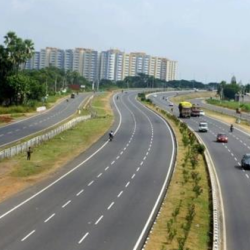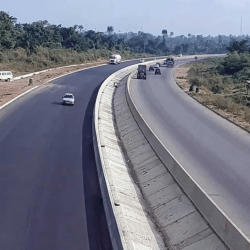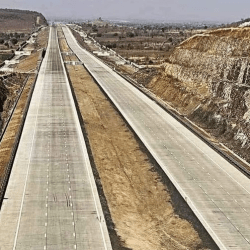The Awash-Mieso Expressway is a 72-kilometer road project designed to improve connectivity between Awash and Mieso. The Ethiopian government has identified the private sector as the primary financier through a PPP model.
- Project Length: 72 km
- Investment Type: Public-Private Partnership (PPP)
- Total Cost: $200 million
- Contracting Authority: Ethiopian Roads Authority (ERA)
- Proposed Duration: 25-30 years
- Current Status: Feasibility study ongoing
Key Stakeholders in the Project
Several entities are involved in the planning and execution of the expressway:
- Ethiopian Roads Authority (ERA): Managing the project’s implementation
- Public-Private Partnership Directorate General: Facilitating and regulating PPP projects
- Private Investors: Expected to finance, construct, and operate the expressway under a Build-Operate-Transfer (BOT) model
Project Scope and Objectives
The Awash-Mieso Expressway project aims to:
✅ Enhance road connectivity between Awash and Mieso
✅ Reduce travel time and congestion for commuters and freight transport
✅ Support economic growth by improving logistics and trade efficiency
✅ Encourage private sector participation in Ethiopia’s infrastructure development
✅ Introduce modern expressway standards to improve road safety
Financial Structure and Cost Estimation
The estimated total cost of the project is $200 million. The funding structure is based on a PPP model where private investors will finance the construction and recover their investment through toll revenues.
| Project Component | Details |
|---|---|
| Total Road Length | 72 km |
| Estimated Cost | $200 million |
| Investment Model | Build-Operate-Transfer (BOT) |
| Project Duration | 25-30 years |
| Revenue Source | Toll collection |
Procurement Mode and PPP Structure
The Ethiopian government has chosen competitive bidding to select a private partner for the project. The expressway will be developed using the Build-Operate-Transfer (BOT) model, which follows these steps:
🔹 Design: The private sector partner will design the expressway
🔹 Build: The investor will construct the road according to expressway standards
🔹 Finance: The private partner will fund the project
🔹 Operate: The investor will collect tolls to recover investment costs
🔹 Maintain: The road will be maintained by the private company
🔹 Transfer: Ownership will be transferred back to the government after the concession period
Benefits of Public-Private Partnerships (PPPs) in Infrastructure Development
PPPs provide several advantages in financing and project execution:
✔️ Reduced government financial burden
✔️ Access to private sector expertise for efficient construction and operation
✔️ Improved quality and maintenance through private management
✔️ Job creation during construction and operational phases
✔️ Long-term revenue generation through tolling systems
Challenges in PPP Implementation
Despite its advantages, PPP implementation faces several challenges in Ethiopia:
⚠️ Regulatory hurdles that may delay project approvals
⚠️ Financial risks associated with toll revenue collection
⚠️ Public resistance to toll-based road usage
⚠️ Project cost overruns and delays in execution
Expected Impact on Ethiopia’s Transportation Network
🚗 Faster travel times: The expressway will reduce congestion and improve mobility.
🚛 Better trade logistics: The road will facilitate smoother transportation of goods.
🏗 Increased PPP investments: This project will set a model for future PPP infrastructure projects in Ethiopia.
Sustainability and Environmental Considerations
To minimize the project’s environmental impact, the expressway is expected to incorporate:
🌱 Sustainable construction materials
🌍 Emissions control measures for toll-managed traffic
🏞 Wildlife-friendly infrastructure to preserve biodiversity
Expected Timeline and Project Milestones
📅 Feasibility Study: Ongoing
📅 Bidding Process: Expected within the next year
📅 Construction Start: Expected within 1-2 years
📅 Completion & Operation: Within 5-7 years
International Funding and Investment Opportunities
The Ethiopian government is actively seeking international investors and financial institutions to participate in PPP projects. Potential funding sources include:
- African Development Bank (AfDB)
- World Bank
- Private infrastructure investment funds
Future Prospects for PPP Projects in Ethiopia
Ethiopia has vast potential for more PPP projects in various sectors, such as:
✔️ Road and highway expansion
✔️ Renewable energy projects
✔️ Airport and railway infrastructure

The Awash-Mieso Expressway is a significant infrastructure project that highlights Ethiopia’s commitment to modernizing its transport sector through Public-Private Partnerships (PPPs). By leveraging private investments, the project aims to improve connectivity, enhance economic activities, and establish a sustainable toll-based road management system.
With careful planning and execution, the expressway is expected to boost Ethiopia’s economic growth, trade efficiency, and infrastructure development, setting a strong precedent for future PPP projects in the country.
❓ What is the purpose of the Awash-Mieso Expressway?
The project aims to improve road connectivity, reduce travel time, and support economic growth.
❓ How is the project funded?
The expressway is financed through a Public-Private Partnership (PPP), where private investors will fund, build, and operate the road.
❓ What is the PPP model used for this project?
The Build-Operate-Transfer (BOT) model, where private investors will manage the road for 25-30 years before transferring it back to the government.
❓ What is the estimated completion timeline?
The project is expected to be completed within 5-7 years after the bidding process is finalized.
❓ How will the toll system work?
The private investor will collect tolls to recover investment costs, ensuring road maintenance and long-term sustainability.




